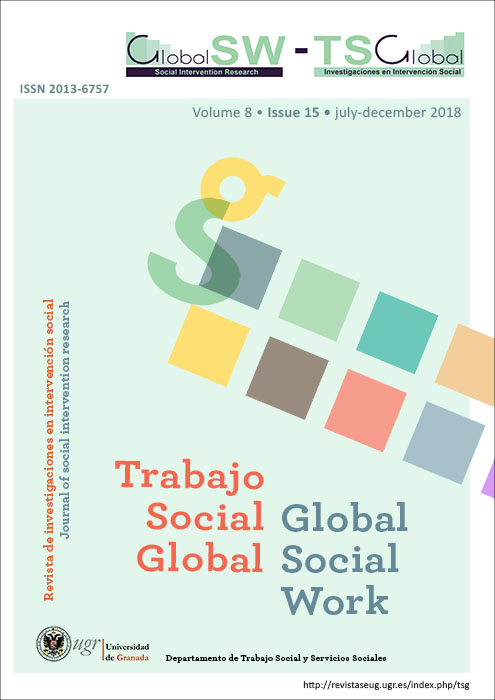Rupture and social suffering. The perspective of Social Work students on the arriving of refugees to Sweden
DOI:
https://doi.org/10.30827/tsg-gsw.v8i15.7441Keywords:
Refugees, Sweden, Migration policies, Social work, social perception, social suffering.Abstract
In 2015, the Swedish government made a shift in migration policy: In order to reduce the amount of refugees arriving in Sweden, the government changed asylum and refugee protection laws, and introduced permanent border controls. In this article, we discuss these changes from the perspective of social work students. Our study is based on qualitative material compiled within the framework of an international project, with the aim of developing good practices for the reception of refugees recently arrived in Europe. The students discussed the responses of the Swedish authorities, expressed their anxieties and concerns about the impact of the policy shift on asylum seekers, society in general and their own environment. Their reflections express uncertainty and impotence, as well as fear, as they meet growing racism, both in public space and their immediate surroundings. We identify the processes described by the students as an increasing loss of community identity. Students suffer from this loss, which reduces their social interactions, contributing to the weakening of social ties and the reinforcement of the processes they criticize. Thus, despite being positioned against refrugee resusal policies, when they discuss Social Work education in relation to migration they maintain the distance between nationals and migrants and reinforce the division between “us” and “them”.
Downloads
References
Bauman, Z. (2011). Miedo líquido. La sociedad contemporanea y sus temores. Buenos Aires: Paidós.
________ (2012). Collateral damage: social ojämlikhet i en global tidsålder. Göteborg: Daidalos.
Brown, W. (2016). El pueblo sin atributos. La secreta revolución del neoliberalismo. Barcelona: Malpaso ediciones.
Canales, M. y Peinado, A. (1998). Grupos de discusión. En José Manuel Delgado y Juan Gutiérrez (Coords.) Métodos y técnicas cualitativas de investigación en ciencias sociales (págs. 288-316). Madrid: Editorial Síntesis.
Fassin, D. & Rechtman, R. (2009). The empire of trauma : an inquiry into the condition of victimhood. Princeton, N.J. : Princeton University Press.
Heffernan, K. (2006). Social Work, New Public Management and the Language of 'Service User'. The British Journal of Social Work, 36(1), 139-147. DOI: https://doi.org/10.1093/bjsw/bch328
Jansson, S. (2016). Sveriges historiska produktion av försvarbarhet. En Maja Sager, Helena Holgersson och Klara Öberg (red.). Irreguljär migration i Sverige : rättigheter, vardagserfarenheter, motstånd och statliga kategoriseringar. . Gotemburgo: Bokförlaget Daidalos.
Kinnvall, C. (2004). Globalization and Religious Nationalism: Self, identity and the search for Ontological Security. Political Psychology, 25(5), 741-767.
Kinnvall, C. & Nesbitt-Larking, P. (2011). The political psychology of globalization: muslims in the West. Oxford Scholarship Online. DOI: 10.1093/acprof:oso/9780199747542.001.0001
Laval, C. y Dardot, P. (2010). La nueva razón del mundo. Ensayo sobre la sociedad neoliberal. Barcelona: Gedisa.
___________ (2017). La pesadilla que no acaba nunca. El neoliberalismo contra la democracia. Barcelona: Gedisa.
Löfven, S. (2015, 26 de septiembre). Refugees Welcome-manifestationen: ”Mitt Europa bygger inte murar” [“Mi Europa no construye muros”]. Nyheterna (TV4). Recuperado de https://www.youtube.com/watch?v=HFpGjX5c5Wk
Martín Criado, E. (1997). El grupo de discusión como situación social. Revista española de investigaciones sociológicas (Reis), 79, 81-112.
Parusel, B. (2016). Sweden’s U-turn on aylum. Forced Migration Review, 52, 89-90. University of Oxford: Refugee Studies Centre. Recuperado de https://www.fmreview.org/solutions/parusel
Regeringskansliet (2016). Lag (2016:752) om tillfälliga begränsningar av möjligheten att få uppehållstillstånd i Sverige. SFS 2016: 752. Stockholm: Sveriges riksdag. [Ley (2016: 752) sobre restricciones temporales a la posibilidad de obtener un permiso de residencia en Suecia]. Estocolmo: Parlamento Sueco.
Socialhögskolan (2017). [School of Social Work. Faculty of Social Sciences. Lund University]. URL: https://www.soch.lu.se/om-institutionen
Downloads
Published
How to Cite
Issue
Section
License
Authors publishing in this journal agree to the following terms:
- Authors retain their copyright. They guarantee to this journal the right to a first publication of the work submitted to initiate the editorial process.
- Authors know that their work is published under a Creative Commons License which allows others to share it, with a recognition of the work's authorship and its initial publication in this journal.
- Authors share with Global Social Work explotation rights of the work that has been published in this journal, authorizing the execution of a free reproduction, distribution and public communication. Authors know that their work will be stored on servers and reproduced in digital format for inclusion in institutional repositories and databases that will facilitates free access to the full text of the work.
- Authors may distribute the version of the work published in this journal (for example, to an institutional repository or publish it in a book), with the explicit acknowledgment of its initial publication in this journal.
Copyright on the texts published in Trabajo Social Global -Global Social Work, as well as editorial policy of the journal refering to self-file and deposit in institutional or thematic repositories, are identified in the database





















